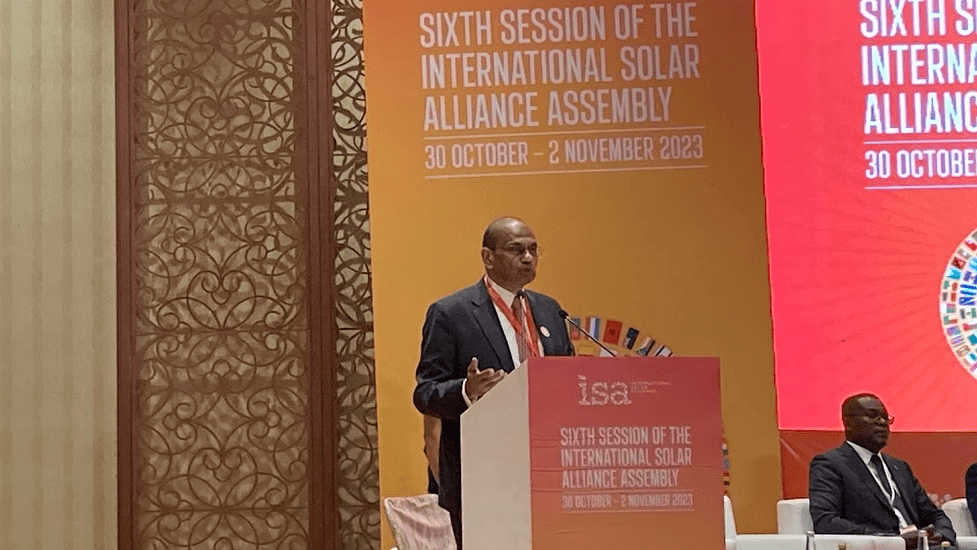In Short : The Director-General of the International Solar Alliance (ISA) highlights India’s solar energy experience as pivotal to its outreach efforts in Africa. India’s successful implementation of solar projects, advancements in technology, and policy frameworks serve as a valuable model for African nations looking to harness solar power for sustainable development.
In Detail : Ajay Mathur, director general of International Solar Alliance, says pioneering efforts in solar mini-grid sector have played crucial role in advancing solar energy accessibility.
New Delhi : India’s significant advancements in solar energy have positioned it as a pivotal player in shaping the policies of the International Solar Alliance (ISA) and the alliance’s outreach to Africa and “small island developing states”, Ajay Mathur, director general of the ISA, has said.
“The government’s proactive initiatives in the solar sector, including updating solar energy targets to 280 GW by 2030, have propelled India’s leadership in renewable energy,” Mathur told ThePrint in an interview.
“Moreover, India’s pioneering efforts in the solar mini-grid sector have played a crucial role in advancing solar energy accessibility…India’s achievements in solar energy serve as valuable learnings that resonate with member countries of the ISA,” added Mathur.
He further said that India’s solar journey has “great potential” for application in Africa and “small island developing states” and through its collaboration with the World Bank, “these insights are being leveraged for broader global impact”.
Conceptualised by India and France on the sidelines of the 21st Conference of Parties (COP) to the United Nations Framework Convention on Climate Change (UNFCCC) in 2015, the ISA focuses on bringing access to energy, ensuring energy security and driving energy transition in member countries. Its website also shows it has 116 member countries, while 95 have ratified the ISA framework.
Global Solar Facility & ISA’s global impact
With nearly 100 ratified members, the ISA has seen a growing global footprint. It has helped facilitate over 9.5 gigawatts of solar applications across 55 countries and imparted knowledge and skills to over 4,000 individuals in emerging economies, Mathur said.
As a part of its efforts to demonstrate the viability of solar energy, the ISA engaged in “demonstration projects” such as the solarisation of the parliament building in Malawi, schools in Kiribati, rural healthcare centres in Fiji, and cold storage facilities in Seychelles.
In 2022, the ISA announced the Global Solar Facility (GSF), initially focusing on Africa, to aid in the ‘quality’ (deepen the reach to low-income countries) and ‘quantity’ (multiply the global investments) of solar investments, according to the ISA website.
“By providing payment guarantees for solar projects, the ISA aims to catalyse international investment in solar energy projects in regions that have historically received a disproportionately low share of global solar investments,” Mathur said.
The overall goal of the ISA, he said, is to create a total corpus of $200 million, with $100 million allocated to the payments guarantee fund, $80 million for the investment fund, and $20 million for insurance. “Through this, the GSF aims to unlock $10 billion in solar investments,” he said.
“The Government of India is considering contributing $25 million to the GSF. The ISA is also providing financial support to the GSF and has committed $10 million to the fund, which will be used to stimulate investments in solar power projects…Bloomberg Philanthropies and CIFF (Children’s Investment Fund Foundation) have also pledged their support to the GSF,” Mathur said.
The objective of the GSF, he explained, is to provide clean energy access to 35-40 million (3.5-4 crore) African households by 2030 — benefitting 200 million people in the region.
Mathur asserted that the ISA has strong support from G7 countries, including the United States, France, Germany, UK, and Japan.
“The developed nations have supported the ISA’s key initiatives, which include implementing solar mini-grids to achieve universal energy access, especially in areas with population densities of 200 to 400 individuals per square kilometre, benefiting around 600 million (60 crore) people,” he said.

